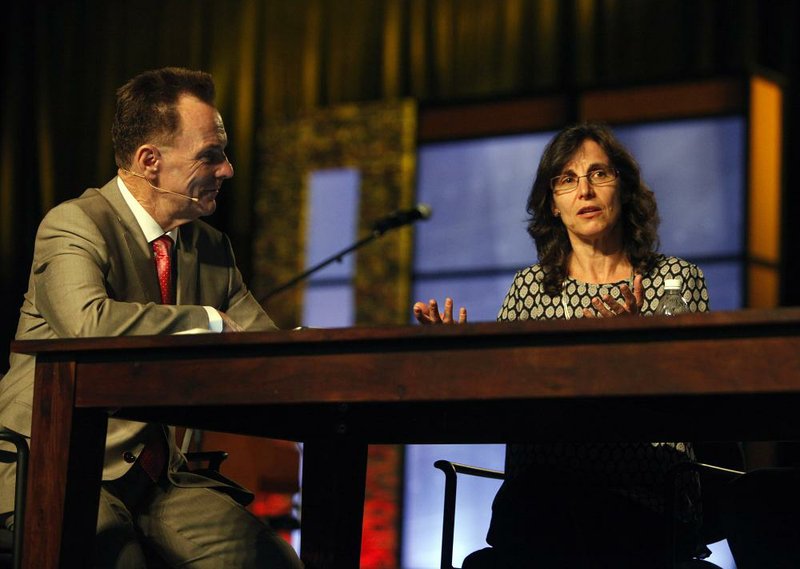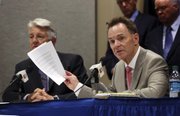COLUMBUS, Ohio -- The last day of the Southern Baptist Convention's annual meeting began with a statement endorsed by the denomination's 17 living presidents declaring, "We will not accept, nor adhere to, any legal redefinition of marriage."
The day's events included an afternoon session with a Presbyterian woman and invited speaker who advised Baptists that sharing the gospel begins with friendship, declaring: "Don't let your words be stronger than your relationship."
The Rev. Ronnie Floyd of Springdale, president of the denomination and pastor of the multicampus Cross Church, held a news conference surrounded by past presidents and issued a statement indicating that they expect the Supreme Court to declare same-sex marriage constitutional. The statement, and afternoon panel discussion, were part of the denomination's attempt to prepare its 15.5 million members for the changes such a court ruling would bring.
The statement signers said they would not recognize same-sex marriage nor officiate at same-sex ceremonies, and encouraged Southern Baptists "to openly reject any mandated legal definition of marriage and to use their influence to affirm God's design for life and relationships."
Moderating an afternoon panel of five speakers on "The Supreme Court and Same-Sex Marriage: Preparing Our Churches," Floyd asked Albert Mohler, president of Southern Baptist Theological Seminary in Louisville, Ky., "what could be the cost" of refusing to perform same-sex ceremonies.
"In the past, people gained social capital by joining our churches," Mohler said. Now they're going to lose it, he said.
"Let's be honest. There's not a danger that the sheriff is going to show up and say, 'You have to do this,'" Mohler said. "The real danger is we're going to pay an enormous social and cultural price. ... We're much more accustomed to being accused of being morally superior. Now a large part of the culture thinks we're morally deficient, and we're going to find that's a very difficult way to do ministry."
Asked about compassionate ministry, panelist Rosaria Butterfield, an author, Presbyterian pastor's wife and former gay atheist, said it begins with providing true community.
"The LGBT [lesbian, gay, bisexual and transgender] community is a real community," she said, noting that every night of the week, some home among her circle of friends was open for a meal and company. "Maybe it was what stood between you and suicide, or boredom, or alcohol.
"Often the Christian community looks very bounded, very rule-driven. ... What if my home is the way of escape, but I'm too busy worrying about if there's cat hair on the couch?"
Butterfield also clarified her path to Christianity. "I was not converted out of homosexuality. I was converted out of unbelief. And then the Lord started working on some other stuff."
Russell Moore, president of the denomination's Ethics & Religious Liberty Commission, noted another way that compassion begins at home.
"We need to equip parents not to be ashamed of their gay and lesbian children," Moore said. "There are many parents that feel somehow that's a reflection on them, that they did something wrong," and that worry about what others will think, that is pride.
"There is no family in the Bible that did not have a prodigal," he continued. "We keep our prodigals, and we keep a home for them to return to. Do not throw your gay and lesbian children out of the house."
The annual meeting drew 5,407 registered attendees -- called messengers -- from churches across the country. Jeremy Byrd, a young pastor of a Dunlap, Tenn., church with average Sunday attendance of 170, has gay friends and family members. "They're my family, and I love them," he said. "We vacation together. I treat them as any other member of my family.
"When someone is struggling, that's not the time" to criticize them, he said. "That's the time to show them what the love of God looks like."
As usual, the meeting was part business, part worship, part rally and part family reunion. Terry Bostick, Arkansas Baptist State Convention team leader for evangelism and church health (formerly called church growth), liked this year's meeting better than others he's attended: "A lot less business, a lot more heart for prayer and revival," he said.
An Arkansan was prominent during the morning's business meeting. Steve Bailey, a messenger from Calvary Baptist Church in Osceola, made a motion to change the church's bylaws to require that nomination speeches given by officers include what percentage -- rather than what dollar amount -- a nominee's church gives to the Cooperative Program. The Cooperative Program is a pool of funds given by the denomination's 46,000 congregations that finance much of the work of Southern Baptists.
He wanted the motion to be put to a vote rather than referred to a committee.
"I made this motion three years ago and didn't get anywhere," he said. "I made it last year and was ruled out of order. I made it this year. I think the convention would like to know how our elected officials support the Cooperative Program on a percentage level."
Messengers were given that option and voted to refer it to committee.
In other business, David Platt, new president of the International Mission Board, said the denomination must broaden its narrow view of missionaries as financially supported solely by the denomination. "God has divinely opened doors for us to take the gospel around the world" through nontraditional means "as students, professionals, retirees -- all of whom can potentially support themselves fully."
Much of the denomination's international missions work is funded by the Lottie Moon Christmas offering, named for an early Baptist missionary to China. After Butterfield's testimony, Moore observed, "We need to recover testimonies in our Southern Baptist churches. The reason we lost testimonies is testimonies are unpredictable. ... We don't ever know what somebody's going to say."
"It just thrills my soul to know that the Lottie Moon of the 21st century mission field is a Presbyterian ex-lesbian sitting with us tonight," he said.
The meeting included a few surprise guests as encouragement for Southern Baptists to stand up for what they believe even when it's costly: former Atlanta Fire Chief Kevin Cochran, fired after writing a book expressing conservative views about homosexuality; and Richland, Wash., florist Barronelle Stutzman, who has been sued for declining to design custom arrangements for a same-sex wedding ceremony.
A Section on 06/18/2015

